Pea protein’s bad reputation is unfounded, says science. This plant-based protein source is known to build muscle just as well as whey protein, and it’s naturally hypoallergenic — that is, it’s naturally free from common allergens like gluten and lactose. (1)
Plus, this vegan protein serves up a respectable dose of vital micronutrients like iron and calcium. And yes, it is a complete protein with all nine essential amino acids. Ahead, learn about pea protein benefits and whether the best pea protein powders are a worthy addition to your supplement stack. (Spoiler: our experts say the answer may well be yes.)
Editor’s note: The content on BarBend is meant to be informative in nature, but it should not be taken as medical advice. The opinions and articles on this site are not intended for use as diagnosis, prevention, and/or treatment of health problems. It’s always a good idea to talk to your doctor before beginning a new fitness, nutritional, and/or supplement routine. Individual needs for vitamins and minerals will vary.
Key Takeaways
- Peas contain 20 to 25% protein by volume naturally. (2)
- Some research has shown that pea protein can produce the same muscle gain as whey protein. (1)
- There are three types of pea protein: pea protein isolate, pea protein concentrate, and textured pea protein.
What Is Pea Protein?
Pea protein is present in many of the best vegan protein powders derived from (drumroll…) peas. Pea protein powder typically comes from yellow peas, and it’s a great source of plant-based protein because it contains all nine essential amino acids, making it a complete protein.
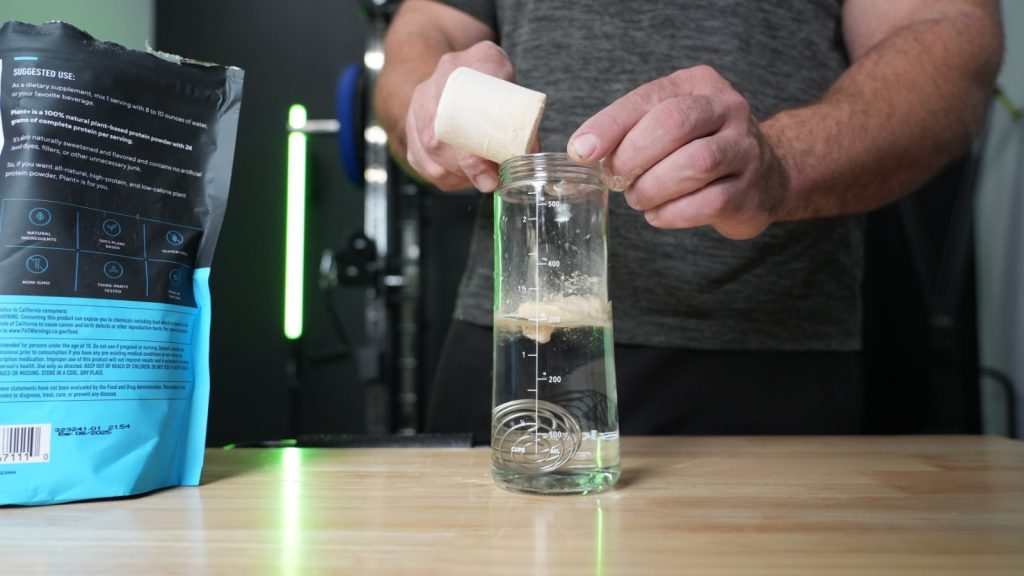
It’s low in methionine, though, so it’s not a bad idea to supplement your pea protein with other plant-based sources (such as brown rice protein) if you eat a vegan or vegetarian diet.
What Are the Different Types of Pea Protein?
Pea protein powder is commercially available in three primary types: isolate, concentrate, and textured pea protein. Like whey protein, these different classifications of pea protein differ in total protein by volume.
Pea Protein Isolate
Pea protein isolate is the “purest” form of pea protein in the sense that it boasts the most protein by volume. It contains the least amount of fat and carbohydrates by volume compared to other types of pea protein. This is the type typically used in protein shakes and protein powders.
Pea Protein Concentrate
Pea protein concentrate has a slightly lower protein content than its sibling, isolate. It contains more fat and carbs by volume; thus, a protein powder made with pea protein concentrate will have more calories (from fat and carbs) compared to a protein powder made from pea protein isolate (assuming the grams of protein per serving are equal).
Textured Pea Protein
You aren’t likely to see this one as part of a pea protein supplement. It’s mostly used as a component in vegan and vegetarian plant-based meat products, like vegan burgers and sausages. It is, as the name implies, very textured and has a similar mouthfeel to some animal proteins.
[Related: Best Organic Protein Powders]
Why You Should Consider Using Pea Protein
Pea protein is an excellent option for anyone looking to minimize or eliminate animal-based proteins from their diet, whether they have adverse reactions or prefer not to consume animal products for personal moral reasons. In the case of textured pea protein, it can be a worthy alternative to individuals who are watching their cholesterol levels, but still crave red meat and enjoy a good burger.
Pea Protein Is Really High Quality
“Plant-based protein supplements are good for those that are vegan, vegetarian, or have a dairy sensitivity,” says registered dietitian nutritionist Austin Bou. “Soy and pea protein isolates have the highest bioavailability amongst plant proteins.”
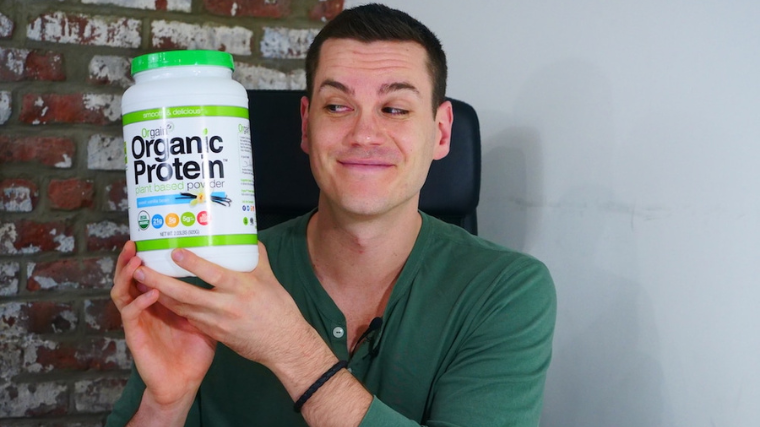
High bioavailability means your body can absorb more pea protein than it can other kinds of proteins, particularly other plant-based proteins. (3) The more bioavailable a protein is, the more amino acids your body can make use of; thus, the greater potential benefit it has on muscle mass.
Additionally, pea protein is high in several essential amino acids, including arginine and the branched-chain amino acids valine and leucine, all of which are required for muscle growth. (4)
All of this is to say that you’ll find pea protein in many of the best protein powders.
Pea Builds Muscle as Efficiently as Whey
Once upon a time, gym bros would have you believe that eating a plant-based diet was a muscle-building death sentence. According to some peer-reviewed research, that’s not the case at all.
In one 2019 randomized controlled trial, for example, study volunteers participated in eight weeks of high-intensity functional training, which is similar to CrossFit. One group supplemented their diet with whey protein and one group supplemented with pea protein, taking it before and after training on training days, and in between meals on non-training days. At the end of the 8-week study, the researchers concluded that “whey and pea protein produce similar outcomes in measurements of body composition, muscle thickness, force production, WOD performance and strength.” (5)
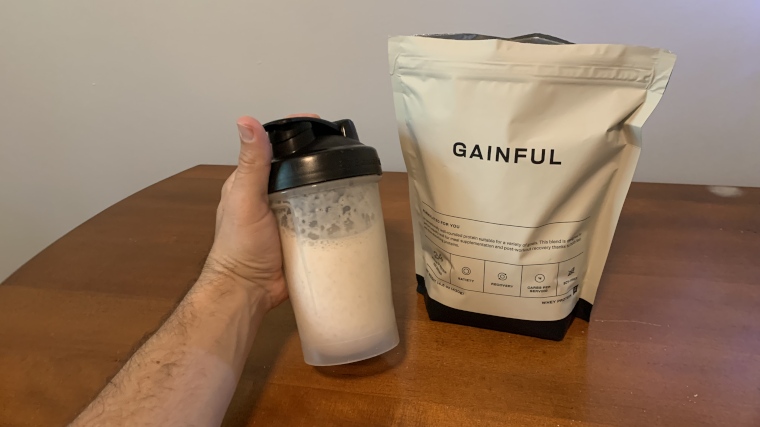
In another study from 2015, researchers investigated the effects of pea protein versus whey protein on muscle thickness when taken in conjunction with a resistance training program. They found that pea protein increased muscle thickness just as readily as whey protein and that in individuals who are new to strength training, pea protein could be more advantageous. (6)
Pea Digests Easily
Pea protein is a viable source of protein for anyone who has trouble digesting milk-based proteins. Even though some whey proteins are so processed that they’re virtually free from lactose, individuals with an intolerance to lactose may prefer to avoid those protein powders. So pea protein may be an especially desirable option for those who experience side effects like bloating from milk-based proteins.
It’s also a viable alternative for individuals on a gluten-free diet, as peas are naturally gluten-free.
As far as amino acid digestibility, one study compared the digestibility of pea protein to casein protein — whey’s slow-digesting cousin known as the “pre-sleep protein” — and found that, overall, pea protein is just as digestible as casein. However, the authors did note that some individual amino acids in pea protein were less digestible than those same amino acids in casein. (7)
Antinutrients Aren’t That Big a Deal
There’s a lot of fear-mongering around pea protein, especially in American media. (What’s new?). You may have heard that peas contain “antinutrients” like phytic acid, a compound that is thought to reduce the absorption of certain minerals. (8)(9)(10)
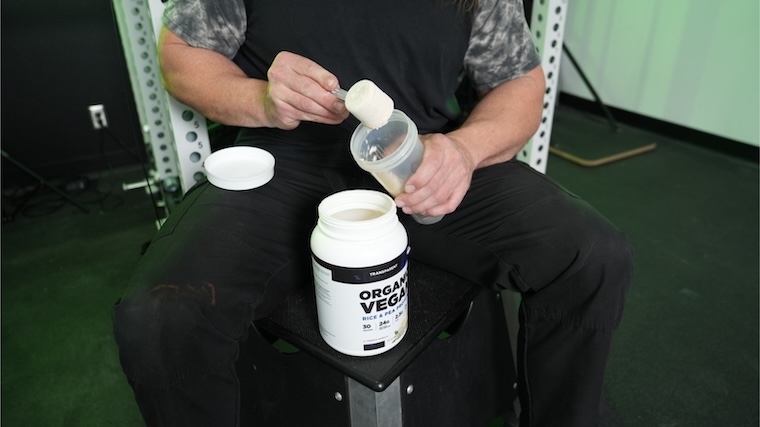
However, most of what we know about peas and their antinutritional factors is about whole peas and not pea protein powder. Processing methods change the structure and contents of the components of peas; plus, if you avoid them, you’re missing out on a host of antioxidant and anti-inflammatory benefits. Additionally, if you’re eating a diet rich in nutrients from a variety of foods, it’s unlikely that the small amount of antinutrients in a serving of pea protein powder is going to undo all of your hard work. (11)(12)
In a 2020 literature review in the journal Nutrients, researchers pointed out that, “it is important to note that antinutrients are not always associated with adverse effects and, in some cases, their effects on the body may be positive. At low levels, phytates, lectins, phenolic compounds, enzyme inhibitors, and saponins may help to reduce blood glucose and/or plasma cholesterol and triglycerides.” (13)
[Related: Best Dairy-Free Protein Powders]
Pea Protein May Confer Other Health Benefits
Pea protein isn’t just a muscle-building powerhouse. It comes with other potential upsides, too. Like any other type of protein powder, pea protein powder can help with a number of health and wellness goals, including weight loss and strength-building. It can make you feel fuller, which can minimize cravings and keep you satisfied between meals when you’re in a calorie deficit. (14)
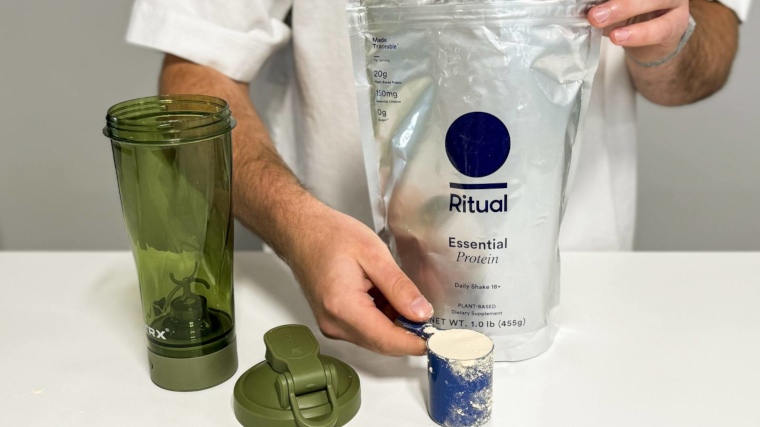
Additionally, pea protein may have positive implications for heart health. In some studies conducted on animals, certain types of pea protein powder have been associated with reduced blood pressure and cholesterol levels. These findings are interesting, but more research is needed to determine the effects of pea protein powder on heart health. (15)(16)
Potential Drawbacks of Pea Protein
Though pea protein is by and large healthy, there are some drawbacks to consider, as well.
Pea Protein Is Low in Methionine
Though pea protein is technically a complete protein containing all nine essential amino acids, it is relatively low in methionine, one of those EAAs. (4) It’s not a bad idea to combine pea protein with another plant-based protein source, such as soy, brown rice, or oat, to ensure you’re consuming sufficient quantities of all EAAs. Brown rice protein in particular has a higher content of methionine, but is low in lysine. Pea protein is high in lysine, which makes these two plant proteins great complements to each other.
Pea Protein May Not Reduce Muscle Damage As Much as Whey
Some studies have investigated the post-workout benefits of pea protein against the post-workout benefits of whey protein. In particular, there’s a growing body of evidence regarding post-workout muscle soreness, and how pea or whey protein might reduce it.
As of yet, whey protein seems to be more powerful for minimizing delayed-onset muscle soreness compared to pea. In a trial from 2020, researchers found that consuming whey protein post-workout had a significant effect on mitigating markers of muscle soreness while consuming pea protein after a workout had an “intermediate effect” on the same biomarkers. (17)
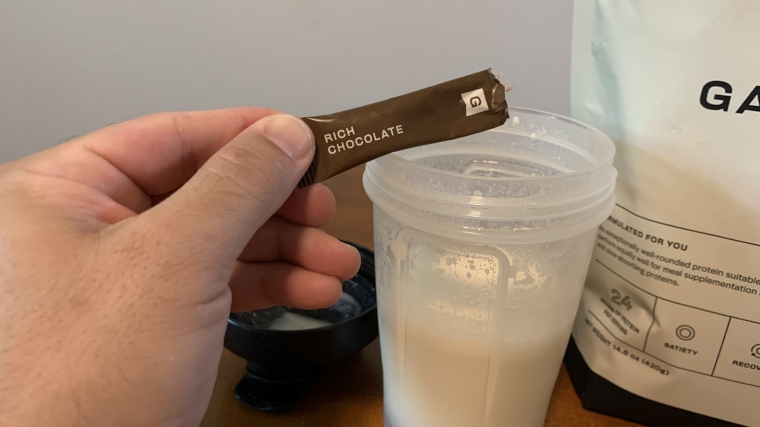
In a small study from 2023, 47 older adults consumed either pea protein or whey protein after walking workouts. After 13 days of walking and supplementing with protein, researchers concluded that only whey protein — and not pea protein — reduced biochemical markers of muscle damage in older adults. (18)
However, one 2023 trial looked at the effects of pea or whey protein on athleticism and recovery in soccer players. In this study, no significant differences were noted between groups, and the authors of the study concluded that there isn’t enough information to choose one type of protein over the other at this point. (19)
Pea Protein Has a Distinct Taste
This con is totally subjective, but worth knowing before you spend your hard-earned dough on pea protein. It can taste a little funky, because, well, peas. To many users, pea protein is rarely among the best-tasting protein powders.
But the earthy taste is easily masked by flavors like chocolate and peanut butter. Cocoa powder is a great mix-in for unflavored pea protein because all you’ll really taste is chocolatey goodness.
Final Word
Pea is a quality protein. If you’re looking to build muscle by increasing your protein intake along with working hard in the weight room, it’s a viable source of protein to help you do that. The protein from these mighty legumes is not just for those on a vegan or vegetarian diet: They can benefit anyone to reach their dietary protein goals.
Pea Protein FAQs
What is the difference between pea protein and whey protein?
Pea protein powder is extracted from yellow peas; whey protein is extracted from milk. These two types of protein powders have different micronutrient profiles (e.g., whey is high in calcium while pea is high in iron, among other differences), but both provide a convenient way to increase your protein intake daily, regardless of how much protein you need. One big difference to note is that pea protein, though a complete protein with all essential amino acids, is low in methionine. If you use pea protein exclusively as your protein supplement, make sure you’re getting methionine from other protein sources throughout the day.
Is it OK to have pea protein every day?
Yes, it’s fine to consume pea protein every day if you don’t have any adverse reactions to pea protein or any ingredients in your pea protein powder. All things considered, it’s one of the best protein powder options for people who prefer to avoid dairy.
Can I use pea protein as a meal replacement?
Pea protein powder isn’t a good meal replacement unless it’s part of a meal replacement shake or powder. Like whey or other plant-based protein powders, the primary purpose of a pea protein powder is to supplementally increase protein intake — not replace a meal. For a meal replacement, look for a shake with 400 to 600 calories and 30 to 40 grams of protein, along with carbs, fats, and a full stack of micronutrients.
References
- Babault N, Païzis C, Deley G, et al. Pea proteins oral supplementation promotes muscle thickness gains during resistance training: a double-blind, randomized, Placebo-controlled clinical trial vs. Whey protein. J Int Soc Sports Nutr. 2015;12(1):3. Published 2015 Jan 21. https://doi:10.1186/s12970-014-0064-5
- Shanthakumar P, Klepacka J, Bains A, Chawla P, Dhull SB, Najda A. The Current Situation of Pea Protein and Its Application in the Food Industry. Molecules. 2022;27(16):5354. Published 2022 Aug 22. https://doi:10.3390/molecules27165354
- Gaudichon, Claire; Calvez, Juliane. Determinants of amino acid bioavailability from ingested protein in relation to gut health. Current Opinion in Clinical Nutrition and Metabolic Care 24(1):p 55-61, January 2021. | https://DOI:10.1097/MCO.0000000000000708
- Gorissen SHM, Crombag JJR, Senden JMG, et al. Protein content and amino acid composition of commercially available plant-based protein isolates. Amino Acids. 2018;50(12):1685-1695. https://doi:10.1007/s00726-018-2640-5
- Banaszek A, Townsend JR, Bender D, Vantrease WC, Marshall AC, Johnson KD. The Effects of Whey vs. Pea Protein on Physical Adaptations Following 8-Weeks of High-Intensity Functional Training (HIFT): A Pilot Study. Sports (Basel). 2019;7(1):12. Published 2019 Jan 4. https://doi:10.3390/sports7010012
- Babault, N., Païzis, C., Deley, G. et al. Pea proteins oral supplementation promotes muscle thickness gains during resistance training: a double-blind, randomized, Placebo-controlled clinical trial vs. Whey protein. J Int Soc Sports Nutr 12, 3 (2015). https://doi.org/10.1186/s12970-014-0064-5
- Guillin FM, Gaudichon C, Guérin-Deremaux L, et al. Real ileal amino acid digestibility of pea protein compared to casein in healthy humans: a randomized trial. Am J Clin Nutr. 2022;115(2):353-363. https://doi:10.1093/ajcn/nqab354
- Schuchardt JP, Hahn A. Intestinal Absorption and Factors Influencing Bioavailability of Magnesium-An Update. Curr Nutr Food Sci. 2017;13(4):260-278. https://doi:10.2174/1573401313666170427162740
- Petry N, Rohner F, Gahutu JB, et al. In Rwandese Women with Low Iron Status, Iron Absorption from Low-Phytic Acid Beans and Biofortified Beans Is Comparable, but Low-Phytic Acid Beans Cause Adverse Gastrointestinal Symptoms. J Nutr. 2016;146(5):970-975. https://doi:10.3945/jn.115.223693
- Lönnerdal B. Dietary factors influencing zinc absorption. J Nutr. 2000;130(5S Suppl):1378S-83S. https://doi:10.1093/jn/130.5.1378S
- Emkani M, Moundanga S, Oliete B, Saurel R. Protein composition and nutritional aspects of pea protein fractions obtained by a modified isoelectric precipitation method using fermentation. Front Nutr. 2023;10:1284413. Published 2023 Nov 2. https://doi:10.3389/fnut.2023.1284413
- Wu DT, Li WX, Wan JJ, Hu YC, Gan RY, Zou L. A Comprehensive Review of Pea (Pisum sativum L.): Chemical Composition, Processing, Health Benefits, and Food Applications. Foods. 2023;12(13):2527. Published 2023 Jun 29. https://doi:10.3390/foods12132527
- Hertzler SR, Lieblein-Boff JC, Weiler M, Allgeier C. Plant Proteins: Assessing Their Nutritional Quality and Effects on Health and Physical Function. Nutrients. 2020;12(12):3704. Published 2020 Nov 30. https://doi:10.3390/nu12123704
- Moon J, Koh G. Clinical Evidence and Mechanisms of High-Protein Diet-Induced Weight Loss. J Obes Metab Syndr. 2020;29(3):166-173. https://doi:10.7570/jomes20028
- Girgih AT, Nwachukwu ID, Onuh JO, Malomo SA, Aluko RE. Antihypertensive Properties of a Pea Protein Hydrolysate during Short- and Long-Term Oral Administration to Spontaneously Hypertensive Rats. J Food Sci. 2016;81(5):H1281-H1287. https://doi:10.1111/1750-3841.13272
- Zhang S, Jin W, Zhang W, Ren F, Wang P, Liu N. Pea Albumin Attenuates Dextran Sulfate Sodium-Induced Colitis by Regulating NF-κB Signaling and the Intestinal Microbiota in Mice. Nutrients. 2022;14(17):3611. Published 2022 Sep 1. https://doi:10.3390/nu14173611
- Nieman DC, Zwetsloot KA, Simonson AJ, Hoyle AT, Wang X, Nelson HK, Lefranc-Millot C, Guérin-Deremaux L. Effects of Whey and Pea Protein Supplementation on Post-Eccentric Exercise Muscle Damage: A Randomized Trial. Nutrients. 2020; 12(8):2382. https://doi.org/10.3390/nu12082382
- Spoelder M, Koopmans L, Hartman YAW, et al. Supplementation with Whey Protein, but Not Pea Protein, Reduces Muscle Damage Following Long-Distance Walking in Older Adults. Nutrients. 2023;15(2):342. Published 2023 Jan 10. https://doi:10.3390/nu15020342
- Loureiro LL, Ferreira TJ, Cahuê FLC, Bittencourt VZ, Valente AP, Pierucci APTR. Comparison of the effects of pea protein and whey protein on the metabolic profile of soccer athletes: a randomized, double-blind, crossover trial. Front Nutr. 2023;10:1210215. Published 2023 Sep 22. https://doi:10.3389/fnut.2023.1210215